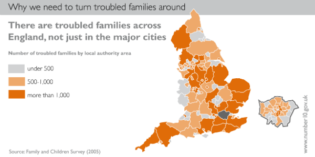Tag: Paul Cairney

The UK government’s imaginative use of evidence to make policy
It is a frequent complaint by public policy academics that the UK government does not follow evidence-based policy, and instead cherry-picks research to further its political priorities to produce ‘policy-based evidence’. However, writes Paul Cairney, evidence is used to inform policy in more ways than these two opposing categories suggest. As illustrated by family intervention initiatives, the cynical and short-term use of evidence to make policy in one arena can provide cover for more sincere and long-term policymaking in another.

Idealism versus pragmatism in politics and policymaking: Labour, Brexit, and evidence-based policymaking
Paul Cairney aims to highlight some important links between three current concerns: Labour’s leadership contest, the Brexit vote built on emotion over facts, and the insufficient use of evidence in policy. In each case, there is a notional competition between ‘idealism’ and ‘pragmatism’ (as defined in common use, not philosophy); the often-unrealistic pursuit of a […]

Brexit is a Godsend for the strongest Scottish ‘Yes stories’, but a second referendum may still turn up a ‘No’ vote
Paul Cairney says that his gut says that there will be a second referendum on Scottish independence and that Yes will win comfortably. Yet, predicting political events and outcomes right now is like predicting the weather. The result is not inevitable, largely because the key factors prompting people to vote No have not gone away – […]

A guide to making up your mind in the referendum on EU membership
Andrew Glencross and Paul Cairney give some advice on how to wade through all the information on ‘Brexit’ to make an informed choice. Andrew offers a more thorough discussion in Remain or Leave? A MOOC on the UK Referendum on EU Membership. Similar PostsIt would be a democratic travesty for Brexit not to be accepted […]

The biggest lesson from the Scottish Parliament election: if you are determined to make and act on the argument about identity politics you should do it well
Scotland recently re-elected the SNP to run the Scottish government, albeit with a reduced majority. A new development was the rise of the Scottish Conservatives, who claimed second place after an increased vote share. Here, Paul Cairney discusses the implications the vote has for a potential future second independence referendum. Similar PostsBeyond anecdotes on lowering […]

The time is right for an audit of Scottish democracy
Last year, we launched Democratic Audit – Scotland to provide meaningful, in depth, scrutiny of Scotland’s democratic record. The aim of the site, explains Paul Cairney, is to provide a democratic audit, to examine the effectiveness of its political system, a democratic dashboard, to help members of the public make an informed choice when they participate in […]

In UK and Scottish politics, should you assume that people are ‘stupid’?
Political commentators often make fun of other political commentators when they complain that the public is stupid. Yet, maybe we all do something similar – assume that most people make quick, emotional and habitual decisions to turn a complex world into a series of simple actions. In that sense, the ‘realistic’ political campaigns (and some […]

Five political problems with ‘Full Fiscal Autonomy’ for Scotland
The SNP have turned the Scottish political map yellow, routing Labour, the Liberal Democrats and the Conservatives in winning nearly all of Scotland’s seats. The scale of the next transfer of power from Westminster to Holyrood has been up for debate, with ‘full fiscal autonomy’ (FFA) being suggested. Paul Cairney argues that there are at […]

Constitutional issues look set to only have a marginal influence on the General Election, at least in England
The referendum on Scottish independence held in late September of last year brought constitutional issues to the fore of the political debate on both sides of the border, with Westminster parties seeming to agree that the proposals of the Smith Commission should be implemented sooner rather than later. Paul Cairney argues that despite this newfound focus on […]

The best of Democratic Audit’s 2014 coverage of Scotland’s democratic future
2014 was a momentous year for democracy north of the border, with long serving Alex Salmond stepping down to be replaced by the first female First Minister Nichola Sturgeon. More dramatically still, the country decided its future, opting to stay within the UK, despite a spirited ‘Yes’ campaign which can legimitamtely claim to have changed […]


 Democratic Audit's core funding is provided by the Joseph Rowntree Charitable Trust. Additional funding is provided by the London School of Economics.
Democratic Audit's core funding is provided by the Joseph Rowntree Charitable Trust. Additional funding is provided by the London School of Economics.